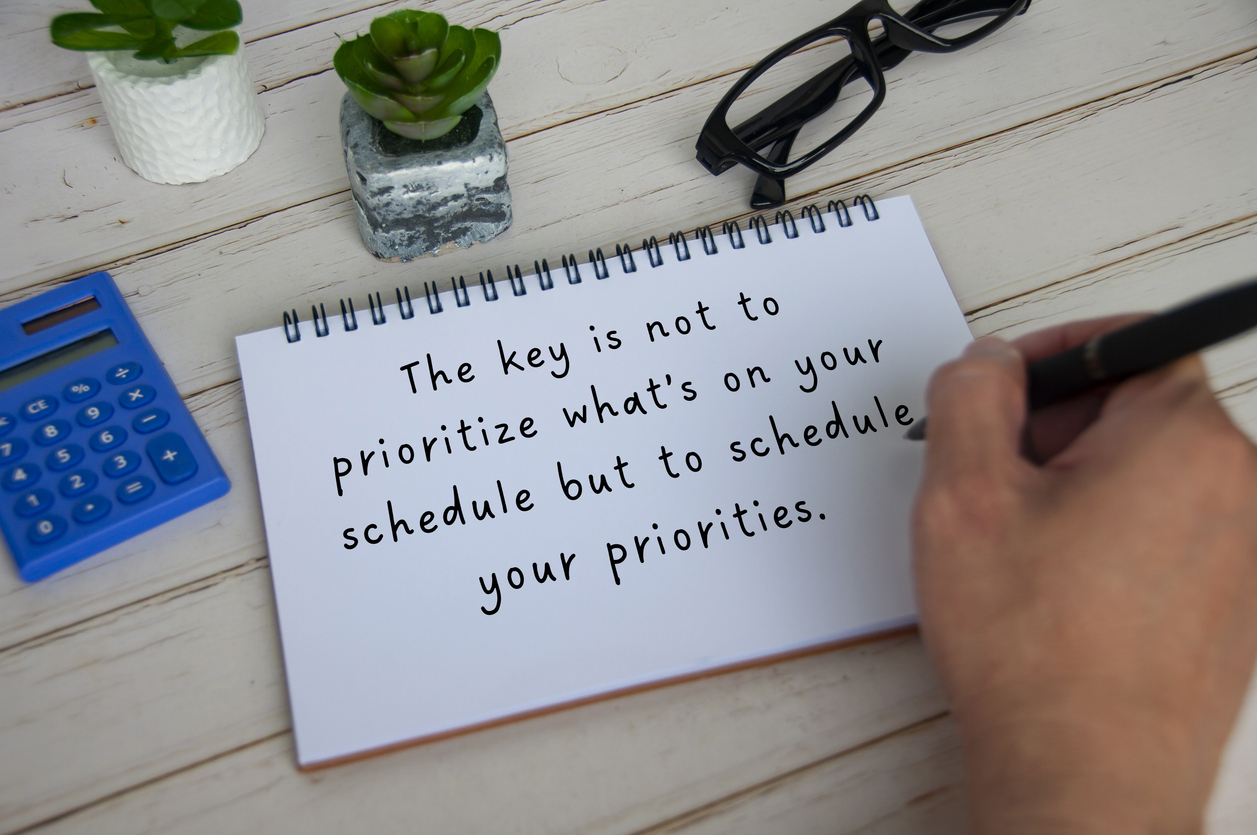
In the hustle and bustle and general busyness of modern life, finding time for ourselves often feels like an elusive dream. We’re constantly bombarded with responsibilities, deadlines, and commitments, leaving little room for self-care and personal fulfillment. However, with effective planning and scheduling techniques, it’s possible to reclaim that precious time and prioritize our own well-being. In this post, I’ll show you how to use the art of planning and scheduling to carve out valuable moments for self-care and relaxation.
Understand Your Priorities
Set Priorities
Before diving into the nitty-gritty of scheduling, it’s essential to clarify your priorities. What are the activities, hobbies, or experiences that bring you joy and fulfillment? Whether it’s spending time with loved ones, pursuing hobbies, or simply relaxing with a good book, identify what matters most to you. By understanding your priorities, you can allocate time accordingly and ensure that your schedule reflects your values.
I recognize that you probably have priorities in several different areas of your life. Lots of different types of responsibilities may make demands on your time. Some may relate to your work, home and/or family (meaning spouse and children), and volunteer activities.
Think through the categories of things to which you devote your time and energy. Make a list of things you do in each category, then prioritize each list.
Here are the essential elements involved in the art of planning and scheduling
Create Routines
Routines provide structure and stability in our daily lives, making it easier to manage our time effectively. Establishing a consistent schedule for work, errands, and leisure activities can help streamline your days and prevent overwhelm. Remember to include dedicated time slots for self-care activities, such as exercise, meditation, or creative pursuits, and treat them as non-negotiable appointments with yourself.
Keeping these appointments with yourself gives you time to rest, relax, and recharge your personal battery. Making you better able to care for the ones you love.
Use Time Blocking
Time blocking involves dividing your day into distinct blocks of time dedicated to specific tasks or activities. Rather than relying on a never-ending to-do list, allocate fixed periods for work, relaxation, and personal endeavors. Be realistic about the time needed for each task, and don’t forget to schedule breaks to rest and recharge. Take a short walk in the park or look out a window at some green space and remember to hydrate.
Set Boundaries
Learning to say no is a crucial skill when it comes to protecting your time and energy. If you are a people-pleaser this may be hard for you to do. When someone asks you to do something and you have a feeling the task will encroach on time you have set aside for yourself give yourself permission to say no. If that is uncomfortable, try saying something like, ‘let me check my schedule and get back to you’. This gives you time to verify that you have set that time aside for something else. Don’t forget to follow up and give the person your answer.
Be clear with yourself about your boundaries with others to safeguard your personal space and prevent overcommitment. Politely decline requests or invitations that don’t align with the priorities you set. Remember that self-care isn’t selfish—it’s a necessary investment in your physical, mental, and emotional health.
Embrace Flexibility
Creating structure to your days gives you the gift to remain flexible and adaptable in your approach to scheduling. Life is unpredictable, and unexpected events or obligations may arise from time to time. When you know what you have planned to do in the coming days or weeks you also know which tasks can be easily shifted, postponed, delegated, or removed from your schedule entirely.
Being flexible and adaptable lets you exercise your problem-solving muscle and adds a little variation to what may otherwise be a firm schedule. Don’t be too hard on yourself when things don’t go according to plan. Say, that’s life, congratulate yourself for being flexible, and move on.
Practice Mindfulness
In the midst of busy schedules and endless to-do lists, it’s easy to lose sight of the present moment. Incorporate mindfulness techniques into your daily routine to cultivate a sense of calm and awareness. Take regular breaks to check in with yourself, breathe deeply, and appreciate the simple pleasures of life. By staying grounded in the here and now, you’ll reduce stress and enhance your overall well-being.
Reflect and Reevaluate
Periodically review your schedule and assess how well it aligns with your goals and priorities. Are you dedicating enough time to activities that nourish your mind, body, and soul? Are there things you want to change to improve your overall quality of life? By regularly checking in with yourself, reviewing your schedule, and making necessary tweaks, you’ll ensure that you’re consistently prioritizing self-care and personal growth.
In conclusion, planning and scheduling are powerful tools for creating balance and harmony in our lives. By taking a proactive approach to managing the demands made on our time and setting aside dedicated moments for ourselves, we can cultivate greater happiness, fulfillment, and resilience. Remember that self-care isn’t a luxury—it’s a fundamental necessity for thriving in today’s fast-paced world. So, go ahead—carve out that time for yourself.
Reach out to me for help creating a better schedule so you can carve out time for yourself. We can work virtually or in-person if you live in the Atlanta area. Email me to set up a free 30-minute phone consultation: DNQsolutions@gmail.com
Diane N. Quintana is an ICD Master Trainer, Certified Professional Organizer in Chronic Disorganization, Certified Professional Organizer, owner of DNQ Solutions, LLC and co-owner of Release Repurpose Reorganize LLC based in Atlanta, Georgia. She specializes in residential and home-office organizing and in working with people challenged by ADHD, Hoarding and chronic disorganization.


It IS an art, and also a science. I’m lucky; carving out time for myself is easy because I’m a singleton without tiny humans. But it is also planned, because I guard my boundaries ferociously to ensure that someone else’s priorities don’t end up overtaking my own. I once had a combative client who was frustrated that I wouldn’t work with him late at night or on weekends or drive 30 miles to work very short sessions. His priorities were somewhat understandable; he wanted what he wanted the way he wanted it. He kept shouting that it didn’t make sense that I would turn down any work, and I patiently explained that if I gave up the time accorded to my personal priorities, I’d be less effective at modeling prioritizing behavior for my clients, and honestly, less effective when I was working because I’d be exhausted and resentful.
I’m all about the productivity tools inherent in time blocking and having routines; they make everything so much easier. I can’t say I’m a particularly flexible person, but knowing you’ve got time assigned for your personal needs does make it easier to shift the chess pieces and make sure nothing gets forgotten.
I love your comment, “Think through the categories of things to which you devote your time and energy. Make a list of things you do in each category, then prioritize each list.”
We often only prioritize one or two big areas and let the rest just take care of itself. Thank you for this great reminder.
I’m a big fan of time-blocking! In my business, working with other small business clients on tasks for them and my own business, time blocking helps me progress my business and support and help my clients. Great reminders! Thanks for sharing your thoughts, Diane.
Diane, this is one of the most compelling blog titles I have ever seen , with many words that speak to my heart: Art, Planning and Scheduling, Carving Out Time for Yourself. Thank you for the reminder that we have to include self-care in whatever form we need it as we decide how we’re going to allocate our time and energy. It’s too easy to forget!
Thank you, Janet! This is something I’m passionate about – we have to remember life is more than just crossing things off a to-do list.
I was just having a conversation with my daughter about priorities. We had watched the old movie “City Slickers,” with Billy Crystal, and there was this scene where one of the characters talks about the only thing that matters in life is one thing. He doesn’t specify what the one thing is, but suggests each person needs to figure out what is most important to them. Knowing our priorities helps us make all the other decisions. If we haven’t clarified priorities, then it is really hard to make decisions about our time, space, and belongings. Such an important point!
Thank you, Seana. It’s all about sitting down with yourself and having a private conversation about priorities in all the aspects of your life. Then sticking to them.
It seems counterintuitive to plan to relax and make time for yourself, but it makes so much sense. How often do you put yourself last? You attend to everyone else’s needs and priorities first. And then, IF there is time, you tend to your needs. But if you commit to caring for yourself, however that looks, you will be more available and have more energy to help others.
I wake up early to meditate, journal, and prepare for the day BEFORE I help others. I also like to make time later in the day to get outside and walk. The fresh air and movement lift my spirits and give me time to recharge.
We are on the same page in so many ways, Linda. Buddy and I take a nice long walk every morning before anything else happens in my house. Thank you for chiming in!